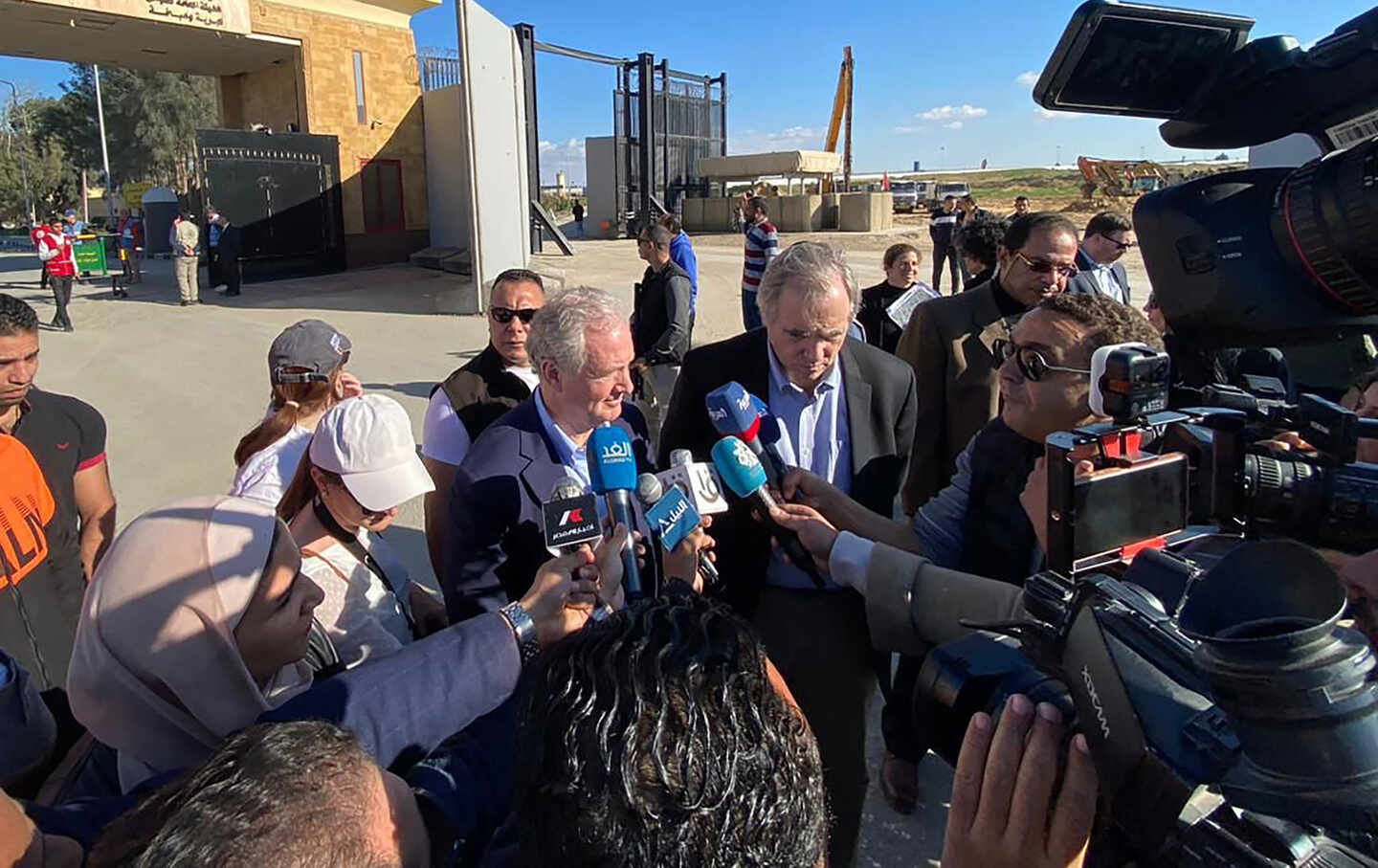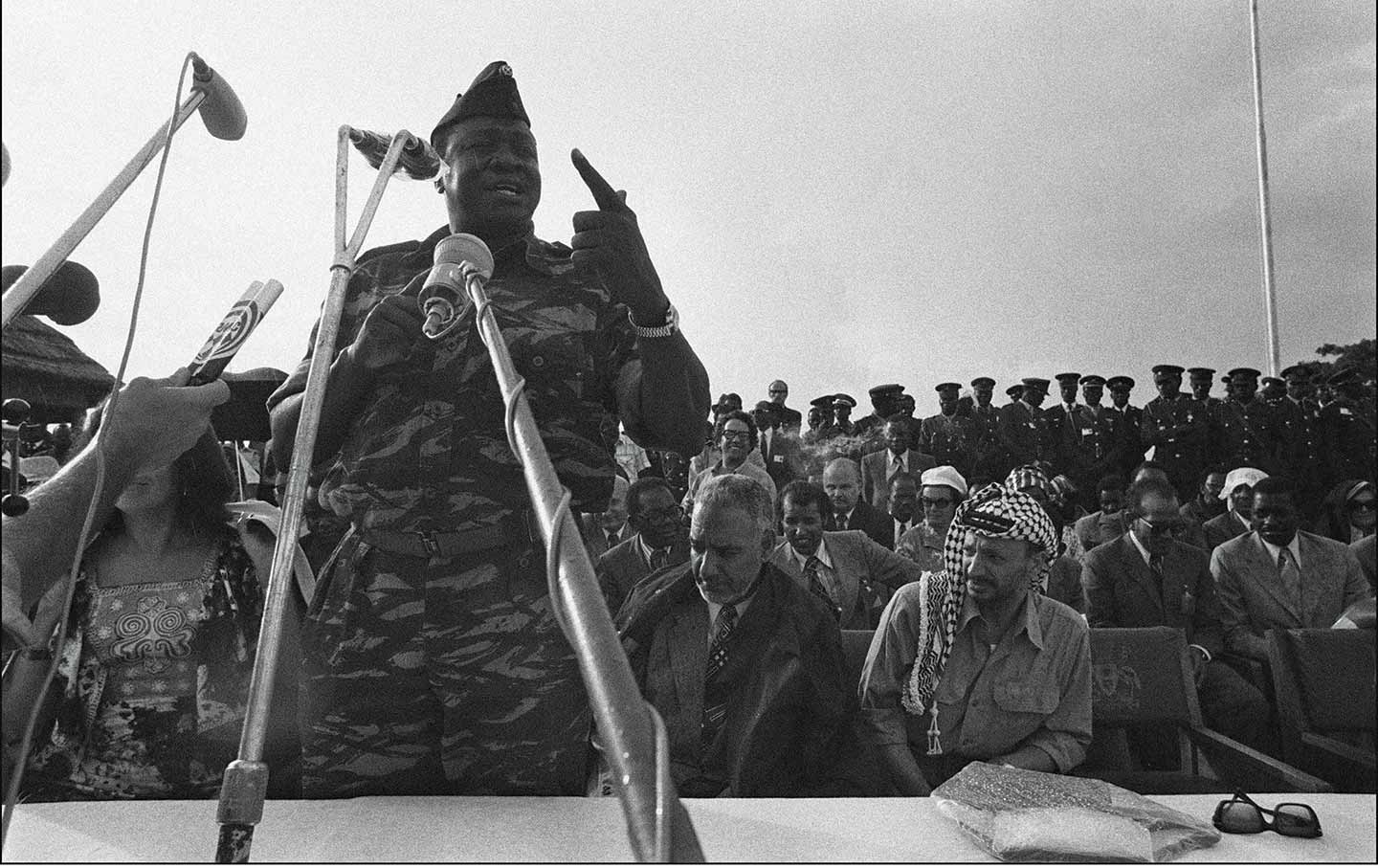
US Senators Chris Van Hollen (C-L) and Jeff Merkley (C-R) talk to the press as they visit the Egyptian side of the Rafah border crossing with the southern Gaza Strip along with a US delegation on January 5, 2024.
(AFP via Getty Images)Jeff Merkley is a progressive Democrat who has represented Oregon in the Senate since 2009.
This interview has been edited and condensed. The full audio and transcript can be found at the Start Making Sense podcast.
Jon Wiener: Recently you went to the Rafah border crossing, between Gaza and Egypt—it’s one of the very few ways for anyone to get into or out of Gaza, and is the principal route for delivery of humanitarian aid. Why did you go, and what did you see?
Jeff Merkley: Senator Chris Van Hollen and I felt like we should try to understand the humanitarian issues, and the best way to do that was to go to Gaza. We tried to get into Gaza. We tried every possible strategy. But quite frankly, none of the governments wanted to risk letting two senators in. We were the only two members of Congress, I believe, who have made it to Rafah Gate.
At Rafah, you can talk to the people who are coming out of Gaza through the gate. You can talk to the truck drivers waiting to get in. You can talk to all the humanitarian aid workers who are seasoned professionals about what’s going on inside. We came back with powerful insight into, an understanding of, the many, many barriers that Israel has set up to efficient delivery of aid: truck drivers who have to stay with their trucks for a week, from the time they pick up a load, get it inspected, and get permission to enter into Gaza. And then the great difficulty they have transferring aid to Palestinian trucks. They don’t want their own trucks damaged. Palestinian trucks, Palestinian drivers who know the area, those drivers are having enormous difficulty figuring out how they can safely deliver aid. The result is that even though there have been some modest improvements, like opening Kerem Shalom, the number of trucks stayed way too low to provide the basic necessities.
So that is the big message: Israel has a clear strategy, a convoluted inspection process, and a failure of deconfliction. By deconfliction, I mean coordinating with the suspension of military activities along the path to warehouses so that supplies can be safely delivered to hospitals and warehouses. You combine all this together, and the humanitarian workers who have been in the worst-conflicted zones in the world told Senator Van Hollen and me that this was far worse than anything they’d ever seen anywhere.
JW: You called for a cease-fire back in mid-November. You were only the second senator to do that. Dick Durbin of Illinois was the first. Even now, in February, only five senators have called for a cease-fire. The five include Elizabeth Warren, but do not include Bernie Sanders. Are there any prospects for more support in the Senate for a cease-fire?
JM: This call has come with many different words. Some have used the term “humanitarian pause.” Some have called for a “cessation of hostilities.” Some have called for “a cease-fire with conditions.” Indeed, no cease-fire would be sustainable if there’s not a release of hostages, if there’s not a transition in terms of Hamas controlling Gaza.
The reason I wanted to use the term “cease-fire” was because of the horrific damage to civilians. The US, time and time again, called on the Netanyahu government to use a much more targeted approach. The US went through this in Fallujah. We used an untargeted approach and then stopped and said, “No, this is not OK,” the amount of damage that’s being done to civilians, and then spent months working out a much more targeted strategy in that war.
But despite the president weighing in, and Secretary of State Blinken, and Secretary of Defense Austin, and many other members of the Biden team, Israel has said, “No, we’re going to continue this strategy with its massive civilian casualties, massive hunger, massive potential for disease—because that’s what we want to do.” They’ve given the stiff arm to the Biden administration.
JW: So what is to be done right now?
JM: I’m now calling on the Biden administration to launch Operation Gaza Rescue: the direct provision of aid to the 14 remaining hospitals, direct provision of food and water at various points along the 40-mile coastline—because we are tied into this catastrophic humanitarian collapse in Gaza, and we all have a responsibility. We tried to solve it through encouraging and urging Israel to change its strategy. That has failed. So we should intervene directly now and supply massive quantities of aid using our military assets offshore for delivery by sea.
Disobey authoritarians, support The Nation
Over the past year you’ve read Nation writers like Elie Mystal, Kaveh Akbar, John Nichols, Joan Walsh, Bryce Covert, Dave Zirin, Jeet Heer, Michael T. Klare, Katha Pollitt, Amy Littlefield, Gregg Gonsalves, and Sasha Abramsky take on the Trump family’s corruption, set the record straight about Robert F. Kennedy Jr.’s catastrophic Make America Healthy Again movement, survey the fallout and human cost of the DOGE wrecking ball, anticipate the Supreme Court’s dangerous antidemocratic rulings, and amplify successful tactics of resistance on the streets and in Congress.
We publish these stories because when members of our communities are being abducted, household debt is climbing, and AI data centers are causing water and electricity shortages, we have a duty as journalists to do all we can to inform the public.
In 2026, our aim is to do more than ever before—but we need your support to make that happen.
Through December 31, a generous donor will match all donations up to $75,000. That means that your contribution will be doubled, dollar for dollar. If we hit the full match, we’ll be starting 2026 with $150,000 to invest in the stories that impact real people’s lives—the kinds of stories that billionaire-owned, corporate-backed outlets aren’t covering.
With your support, our team will publish major stories that the president and his allies won’t want you to read. We’ll cover the emerging military-tech industrial complex and matters of war, peace, and surveillance, as well as the affordability crisis, hunger, housing, healthcare, the environment, attacks on reproductive rights, and much more. At the same time, we’ll imagine alternatives to Trumpian rule and uplift efforts to create a better world, here and now.
While your gift has twice the impact, I’m asking you to support The Nation with a donation today. You’ll empower the journalists, editors, and fact-checkers best equipped to hold this authoritarian administration to account.
I hope you won’t miss this moment—donate to The Nation today.
Onward,
Katrina vanden Heuvel
Editor and publisher, The Nation








